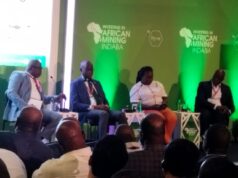Burkina Faso’s mineral resources, the cornerstone of its economy, promise a promising future. The success of this vision depends on maximising the benefits of mining for local populations. With this in mind, the Burkina Faso government has set up the Technical Secretariat for Local Content and Investment Promotion (Secrétariat technique du Contenu local et de la promotion des investissements – ST-CLPI), a central entity within the Ministry of Energy, Mines and Quarries. It focuses on developing human capital, adding value to mining products locally, promoting national investment and evaluating national local content strategies in these areas. In this interview, Local Content Technical Secretary Zéphirin Z. Zongo talks about the importance of this structure in the mining sector.
The current organisation chart of the Ministry of Energy, Mines and Quarries (MEMQ) includes the Technical Secretariat for Local Content and Investment Promotion. What motivated the creation of this central department?
Extractive resources are a major source of income and employment for countries such as Burkina Faso. The impact of this exploitation on development is sometimes difficult to perceive at grassroots level, leading to frustration and conflict. In countries with natural resources, citizens hope that the exploitation of these resources will generate benefits for them. In recent years, the government of Burkina Faso has introduced reforms in the mining sector. The aim of these reforms is to promote sustainable economic development through proper exploitation of mining revenues and the opportunities offered by the sector. The organisational chart of the Ministry of Energy, Mines and Quarries reflects this government option, with the creation of the Technical Secretariat for Local Content and Investment Promotion (ST-CLPI). The aim of creating this structure is, on the one hand, to bring together all the initiatives to promote nationals throughout the mining value chain and, on the other hand, to promote our country’s mining potential.
What are the tasks assigned to the ST-CLPI?
Under article 32 of the decree organising the MEMQ, the ST-CLPI is responsible for designing, coordinating and implementing the Ministry’s policy on local content and investment promotion. As such, it is responsible for: strengthening the impact of the mining and energy sectors on the national economy; developing human capital in the energy and mining sectors; adding value to mining products at national level; and promoting national investment in the energy and mining sectors. It is also responsible for piloting, monitoring and evaluating national strategies for local content in the energy and mining sectors, conducting economic, financial and forward-looking analyses of the energy and mining sectors and contributing to the introduction of optimal taxation in the energy and mining sectors. It is also responsible for seeking and negotiating partnerships between the Ministry of Energy, Mines and Quarries and state, sub-regional and international bodies, as well as the private sector, and for raising the national and international profile of the energy and mining sectors.
What do the energy and mining promotions actually involve?
The Energy, Mines and Quarries sector is undoubtedly one of the driving forces behind the development of our economy. These are two areas that require significant investment. Their development therefore requires a genuine investment promotion strategy, as they are described as “highly capital-intensive production sectors” in terms of the amount of capital (financial resources) they require. The aim is to attract investment by publicising the potential and opportunities in these sectors, both nationally and internationally. To achieve this, the ST-CLPI organises promotional events such as the African Energy and Renewable Energy Week (Semaine des Energies et Energie renouvelable d’Afrique – SEERA), the West African Mining Week (Semaine des Activités Minières d’Afrique de l’Ouest – SAMAO), the Artisan Miner’s Day (Journée de l’Artisan Minier – JAM) and coordinates the Ministry’s participation in energy and mining investment promotion events, with the aim of raising the national and international profile of Burkina Faso’s energy and mining sectors.
The Government of Burkina Faso has adopted Local Content in the energy, mining and quarrying sectors. What does the concept of Local Content entail?
The concept of local content originated in Great Britain in the 1970s and has been developed in most oil industries. It aims to facilitate the development of a local industrial fabric and local skills by involving them in the activities of the extractive industries in order to improve the spin-offs of the extractive industries sector beyond the direct revenues paid to the State. In simpler terms, local content can be understood as the value that an extractive project brings to the local, national or regional economy, over and above the direct revenues derived from the exploitation of these resources. Today, countries such as Botswana, South Africa and Ghana are models of virtuous mineral resource management, having succeeded to a lesser extent in structurally transforming their economies through the promotion of national expertise.
Why is local content an important issue for Burkina Faso?
The Burkina Faso Mining Code of 2003 did not make clear reference to local content under its section Rights and Obligations of Mining Operations. It was, however, mentioned in the Convention Minière-Type. However, data in the mining industry indicates that purchases of goods and services by mining companies are far greater than the revenue the sector generates annually through tax payments by these companies. As a result, strategies to promote local purchases of goods and services by mining companies are likely to have positive effects on the national economy. In the case of Burkina Faso, a diagnostic study carried out in 2018 revealed the weakness of these local purchases. Out of a sample of twelve (12) mines, purchases of goods and services from local suppliers amounted to 456.5 billion FCFA, of which 71.7 billion FCFA, or 15.5%, came from local suppliers. Although these figures are relatively recent, they reflect the efforts that need to be made in terms of local procurement of goods and services. This is why the 2015 Mining Code was adopted with major innovations with the aim of boosting a new dynamic in the management of our mining sector. Articles 101 and 102 of the Code include provisions on local content. The implementation of the provisions of these articles, combined with the country’s current vision for mining, has led to the adoption of a national strategy for local content, as well as a regulatory framework for the local supply of mining goods and services. In simple terms, the aim is to ensure that companies in which Burkina Faso nationals have a majority shareholding have preferential access to the goods and services markets of mining companies, and to promote national expertise in terms of human resources. The legal framework will be strengthened by the pending adoption of a law on local content. In the energy sector, a local content strategy is currently being drawn up. The aim is to create the conditions to encourage the emergence of national expertise in the field of energy.
What does it involve?
The local content strategy for the mining sector is accompanied by a three-year rolling plan for its implementation. The ST-CLPI is responsible for coordinating the implementation of the activities set out in the three-year action plan and for monitoring compliance with the regulatory provisions in force. In addition to the Department of Mines, the implementation of the strategy involves both state and non-state actors. These include certain ministerial departments, local authorities, umbrella organisations or socio-professional organisations of private sector players (CCI[1]BF, CMB, ABSM, ACAB, AFEMIB, ACB), civil society organisations and technical and financial partners. The decree setting out the conditions for local supply in the mining sector and the order establishing the list of goods and services supplied to mining companies were adopted on 11 November and 30 December 2021 respectively. These texts came into force on 1 January 2022. A communication plan has been drawn up to give key players access to information on local content. To this end, the ST-CLPI has organised a number of workshops to publicise the texts, as well as consultation meetings with stakeholders such as the Burkina Faso Chamber of Commerce and Industry (CCI-BF), the Burkina Chamber of Mines and the Burkina Alliance of Suppliers of Mining Goods and Services (Alliance burkinabè des fournisseurs des biens et services miniers – ABSM). Many activities, including studies, have been launched to improve the competitiveness of national companies. These include the feasibility study for the construction of bonded warehouses for suppliers of goods and services to the mines, which is currently underway; the feasibility study for the establishment of a business relations platform between suppliers of mining goods and services and principals, for which the consultant recruitment process is underway; and the feasibility study for the establishment of a guarantee fund to support national champions in the mining sector. There is also a study to assess the practices and performance of local content by mining companies and the capacity of the local private sector to establish commercial links with foreign direct investment in Burkina Faso, which will enable a better mapping of suppliers and goods and services provided in the mining sector. What steps should Burkina Faso companies take to make the most of the benefits of Local Content? The government has created the conditions that will enable Burkinabè companies to access markets, but they obviously need to be able to respond effectively [1] to the needs of mining companies. Nor should the new provisions on local content compromise the continuity of mining operations. It must be a win-win situation for the three stakeholders: the government, the suppliers of goods and services, and the mining companies. One of the elements to be taken into account is facilitating access to information for mining companies. It is important for national companies to have clear information on the needs of the companies, their channels for publishing bids and all the conditions to be met, if any. On the government side, mining companies and their subcontractors are required to submit their supply plans on a regular basis, but we are also inviting the promoters of national companies to approach the companies and develop the strategies they need to win and keep these new outlets. They must quickly meet the mining companies’ requirements in terms of deadlines, prices and quality. To achieve this, the umbrella organisations need to develop and implement capacity-building initiatives for the national private sector, and to help them gain access to financing from banks and financial institutions. Some of these actions are already planned in the local content strategy and their successful implementation will be quite beneficial to national companies.
What appeal do you have for those involved in implementing Local Content?
The main call is for support, commitment and mobilisation. These are the elements that will enable us to successfully implement local content in our country. This appeal is addressed as much to the national private sector as to mining companies and subcontractors. Each player is invited to show good faith. I would like to reassure the various partners of the willingness and determination of the department in charge of mines, through the ST-CLPI, to fully implement the regulations on local supply. In conclusion, we hope that the discussions taking place during this edition of SAMAO will enable us to draw up recommendations and identify avenues to explore that could usefully improve local content, both in Burkina Faso and in other African countries, in order to improve the impact of mining on national economies.
This article was excerpted from the magazine Spécial #SAMAO2023
Download the entire magazine at this link
#Mines_Actu_Burkina










